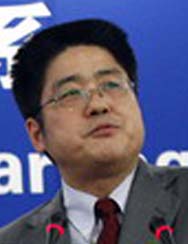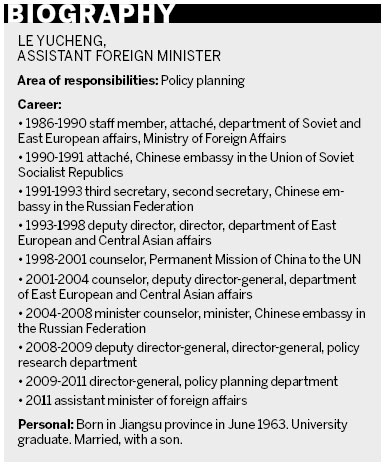China, US 'destined' for shared interests
Updated: 2012-04-11 13:20
By Hu Yinan (China Daily)
|
|||||||||||
Win-win cooperation is the 'new answer': Assistant foreign minister
As Europe's debt crisis resurfaces and the United States struggles to bolster its own economy, Beijing and Washington are "destined to form a community of shared interests, responsibilities and destinies" one way or another, a senior Chinese official said on Tuesday.
"Like it or not ... I believe our two countries have the responsibility, ability and wisdom to forge a new type of relationship between major countries, marked by sound interaction and win-win cooperation," Assistant Foreign Minister Le Yucheng told a forum in Beijing.
|
 |
|
Le Yucheng, assistant foreign minister |
"In this networked world of myriad challenges, win-win cooperation is not a choice but the choice," he said, stressing that this is precisely the "new answer" Washington is seeking in its attempts to reconcile with China's rise.
Referring to China, US Secretary of State Hillary Clinton in March said Washington is "now trying to find an answer, a new answer to the ancient question of what happens when an established power and a rising power meet".
That answer is a much-needed one. The latest US Labor Department data released on Friday showed that US employers added 120,000 jobs in March, a figure significantly lower than the forecast gain of 203,000 jobs. The increase was the smallest since October.
With slow job growth at home and worries of a hard landing by the Chinese economy in an already hard-hit global economy, analysts are questioning whether Washington is capable of improving the state of the world economy alone.
|
 |
Meanwhile, in Shanghai, the Development Research Center of the local municipal government on Friday said an expected manufacturing renaissance in the US - a prediction by the Boston Consulting Group - would have considerable negative influence on China, the de facto "world factory".
"As it will primarily hit our manufacturing industry, we must soberly realize this, take measures and actively react," the center said in a report.
In Beijing, Le said economic recovery could only be possible by joining hands. And as the world's second-largest economy after the US, China remains a developing country, he said.
China is not "the No 2 world power", Le said, cautiously dismissing Clinton's March speech, in which she said the US wants China to become a "full stakeholder" instead of a "selective" one in the global system.
"What we are talking about is not a matter of choice, but a question of capability," Le said, adding that China, for all its growth and progress, "still has many weak links".
Despite a 10 percent annual average GDP growth in the past 30 years, about 128 million Chinese, or 40 percent of the US population, were still living in poverty as of November, official figures showed.
|
 |
In a country that needs to create 25 million jobs every year, the livelihood of its 1.35 billion residents is the "top priority of the Chinese government", Le said.
"The vastness of China and the swiftness of its development have accompanied many problems, some imaginable, others unimaginable. The outside world has responded to them with benign reminders, as well as hype over our misfortunes and consistent blame."
"The Chinese people know best about China's problems and what the priorities are."
Turning again to the shifting world order, Le said the rising powers, on which the global economic recovery and growth have come to depend, are not to be blamed for "the inherent domestic difficulties and problems" of certain countries.
"Emerging countries are not troublemakers. Their rise is not a challenge, much less a threat, but an important contribution and rare opportunity for the world," he said.
Some have conceived the recent shift in global dynamics, one in favor of the rising powers, as a security threat, Le said, calling this view "unfair".
Leaders of China, Russia, India, Brazil, South Africa, collectively known as the BRICS group, just wrapped up a summit in New Delhi in late March. The bloc, with 42 percent of the world's population and a fifth of its GDP, vowed to play a more active role in global affairs in a joint declaration.
While some observers believe the rising powers pose a challenge to, and may ultimately help end Western supremacy, Le said that the "zero-sum game" mentality must change in an increasingly interconnected world.
The basic material foundations for a multipolar world of peaceful coexistence are already in place, said Dong Manyuan, a researcher with the China Institute of International Studies.
"The future is bright, but the road to success won't be smooth. There are many uncertainties, challenges and difficulties," he said.
huyinan@chinadaily.com.cn
Related Stories
China driving US exports 2012-03-30 07:31
Former US officials look back at US-China ties 2012-03-08 13:28
A rising China good for US: Clinton 2012-03-08 13:26
China welcomes US efforts to expand hi-tech trade 2012-03-26 09:25
Today's Top News
President Xi confident in recovery from quake
H7N9 update: 104 cases, 21 deaths
Telecom workers restore links
Coal mine blast kills 18 in Jilin
Intl scholarship puts China on the map
More bird flu patients discharged
Gold loses sheen, but still a safe bet
US 'turns blind eye to human rights'
Hot Topics
Lunar probe , China growth forecasts, Emission rules get tougher, China seen through 'colored lens', International board,
Editor's Picks

|

|

|

|

|

|





